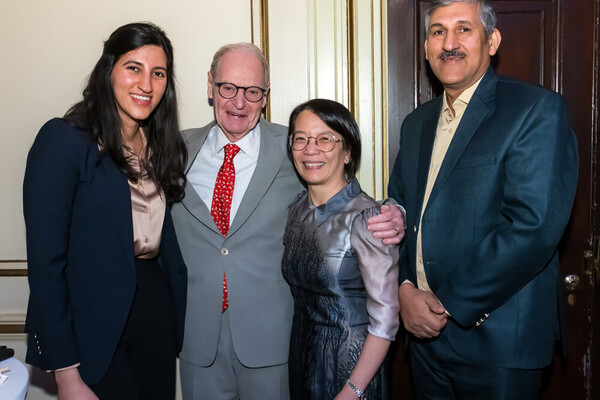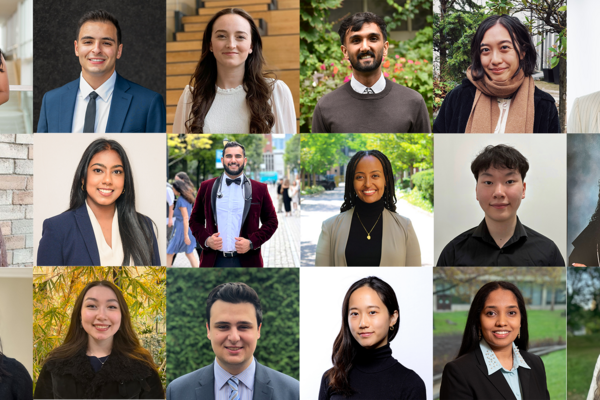Main Second Level Navigation
Breadcrumbs
- Home
- News & Events
- Recent News
- Hockey Legend Mats Sundin Talks to U of T Medicine about Hockey, Breakfast and Losing His Teeth
Hockey Legend Mats Sundin Talks to U of T Medicine about Hockey, Breakfast and Losing His Teeth

On March 25, U of T Medicine’s April Kemick sat down with the Hockey Hall of Famer to chat about health, how he stays fit, and the lifestyle advice he plans to pass along to his seven-month-old daughter.
When you were a kid, did you just play hockey or did you enjoy other sports or activities?
That was the best part of growing up. My two brothers [one older and one younger] and I were allowed to do anything we wanted in terms of sports. We played hockey, soccer, tennis and golf. Our parents made sure we were active and kept us in different activities and sports.
What types of food were on the menu on game days – did you have a favourite pre-game meal?
When you’re a professional athlete, you look to be as good as you can be in all areas – not only training and working on skills as a hockey player, but you also understand that sleep, what you eat, how you prepare yourself off the ice is just as important as what you do on the ice.
You learn from an early age to eat lots of different vegetables and fruits - get all the different criteria of food into yourself to prepare and play hockey at the highest level. Nutrition is always very important for a professional athlete, as well as anyone.
When you stop working out one to three hours each day, you have to change the way you eat. But I think I eat as good as I did when I played, just a little bit less.
With a physically demanding schedule – practices, games, workouts, travel – what kept you motivated during your professional hockey career?
I was fortunate. Playing hockey has always been my hobby and my biggest passion. To have that as your work was easy for me. The travel wasn’t a problem. It’s a young mans’ sport and I used to be able to cope with the travel. It helps to be young to play a sport at a professional level.
Now I’m in the middle of my life, hopefully, but in terms of hockey I think the average career for a hockey player is five years and I played for almost 18, so I was fortunate to stay healthy, compete and play at the highest level.
As an athlete, tell me about the role doctors, physiotherapists and trainers played in keeping you healthy all those years?
I was fortunate to have great support on every level in terms of nutrition and doctors to help when you’re hurt or have other problems – these people play a major role when you’re a professional athlete and recovering from various injuries. They help you stay healthy for a long period of time.
What was the worst injury you had to recover from?
Obviously every hockey player loses their teeth, pretty much. It happens to everyone. The most serious injury was losing part of my vision in my left eye. I got a puck in my eye - we were playing Ottawa - and I ended up losing about eight to nine per cent of my vision. It doesn’t really affect me in daily life, but it was scary when it happened.
Now that you’re retired, how do you stay fit?
Really nothing changes. I think exercising from a young age taught me a lifestyle and I keep doing it. I exercise, stay fit and make sure I get good nutrition. It’s not at the highest level like in the NHL, but three to four times a week I do a workout and make sure I eat properly.
I run, ride a bike and try to do things that I enjoy. I cross-country ski and I play hockey still a little bit at charity events over the year. I’m actually going to prepare because the Maple Leafs and Detroit Red Wings have an alumni winter classic coming up so the veteran guys have a big game on December 31.
What types of healthy lifestyle habits do you and your wife hope to pass along to your daughter?
You realize as you get older that exercise is important, but also nutrition. It sounds like a cliché, but breakfast is the most important meal of the day to start your metabolism. It’s like a car – you have to fill up the tank before you start working. [I’ll encourage my daughter to eat] lots of fruit and lots of vegetables and stay away from processed food. Try to get lots of sleep – you realize how good sleeping habits are important for a healthy life. It’s not complicated – simple things keep us healthy
Will you encourage your daughter to play sports when she’s older?
Yes, I am already planning. She looks like she will be tall – maybe six feet - so I’ve got to get a tennis racquet in her hand. She’s only seven months now, so I’m going to wait a couple more months before I buy her first tennis racquet. Start them young! I’m just kidding, we will let her do whatever she wants, but we will encourage her to be active. I think it’s very important for a healthy life to get her in different activities. Whether its sports or dance, we will encourage her to try different things.
Other than hockey, what is your favourite sport to play?
[I grew up in an active family so] I’m into to all kinds of sports - lots of outdoor activities like camping and fishing in the summertime. Sweden has lots of mountainsides –it’s similar to Canada and I enjoy a lot of outdoor activities.
[In terms of watching sports], hockey is always going to be a passion and close to my heart. But I watch soccer, tennis and some other sports. I watch everything.
News


